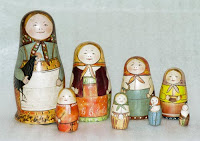In 2008 I wrote a column for a Dutch magazine in which I assert that even people who do not want to do business in China or have no interest in IP at all, should take an interest in it, since IP in China will find you. Wherever you are. To map this process I started in April 2009 with IP Dragon’s Worldwide Review of Seizures and Measures Against Counterfeit and Pirated Goods Originated From China. The Worldwide Review is regularly updated, latest for example about Matryoshkas made in China.
Last week IP Dragon was giving a presentation about the differences between IP in Hong Kong and China to the students of the University of Amsterdam’s Institute of Information Law who were on an IP excursion to the Special Economic Region. The Amsterdam students’ imagination could not entail the fact that eggs are counterfeited in China (and Malaysia). Earlier I wrote about fake egg school, where they teach migrants to the big cities how to manufacture fake eggs: ‘You Cannot Buy A Real Egg in China Without Breaking It‘. These eggs could severely harm someone’s health. The students asked me how one could distinguish between fake and real eggs. According to Key of ChinaHush, which has an excellent article on the phenomenon the pointers to identify fake from real are:
1. Fake egg’s shell is a little shinier than the real egg, but it is not very noticeable.
2. When touch the fake egg by hand, it feels a little rougher than the real egg.
3. Shake the fake egg will make some noises, because water overflows from the solid agent.
4. Real egg smells a little like raw meat.
5. Tap the egg lightly. Real egg makes a more crisp sound than the fake egg.
6. Shortly after opening the fake egg, egg yolk and egg white will melt together. This is because the egg yolk and egg white are made of the same raw materials.
7. When frying a fake egg, the yolk will spread without being touched.
Recently fake eggs have been found in Malaysia. Read in the Borneo News here. It is unclear whether they were domestically made or originate from China. Since fake eggs can not spoil transport from China might be possible. How to solve this problem? A student suggested to stamp the eggs, but stamps can be easily counterfeited as well. I proposed to register each egg, so that you can look up a code and see whether an egg is genuine. “Check an egg!” a student said. Good name for such a website, indeed.
Now you might be a vegan, having nothing to do with animal products. Unfortunately even then IP in China could pose a problem for you: fake rice. And it is not feasible to register each rice grain. Product chain protection and authentication technology are invaluable in China. Read here.


Dear Suzanne,Thank you for your question. In a supermarket there are different kinds of egg suppliers which offer their eggs under different brands, including house brands. These can be trademarked. I used the fake eggs as illustration that the trend is that daily products are counterfeited, not just luxury goods. In the same vain, just last week three children in China died. Their parents thought they bought a certain milk brand, but it was counterfeited.Good luck with graduating. Will check out your blog.Cheers,Danny
Beste Danny Friedmann,Ik ben één van de studenten die vorige week aanwezig was bij uw college over fake eggs. Ik wil u hartelijk bedanken daarvoor! Het was informatief en spraakmakend. Wat ik (en meer studenten) ons afvroegen, was waarom u (intellectueel eigendomsrechtelijk) geïnteresseerd bent in fake egg's. 'Gewone' eieren zijn naar mijn mening niet ie-rechtelijk te beschermen. Fake-egg's zijn, lijkt mij, dan ook ie-rechtelijk niet interessant. Grappig is het natuurlijk wel. Zelf heb ik ook een juridisch getinte blog (http://thelegallifeofsuusjeq.blogspot.com). Ik vind het daarom erg leuk dat u een blog bijhoudt en ik ga deze zeker volgen.Met vriendelijke groet, SuzannePS. De opmerking van mijn medestudent was overigens 'check your egg'.